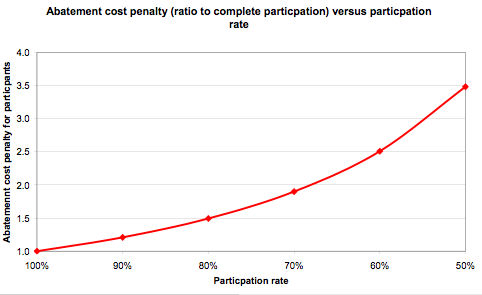THE Wall Street Journal states: “The public hates it.” The (UK) Telegraph calls the tax: “one of the most unsuccessful in history” and points out that it is “unique in that it generated virtually no revenue for the Australian Treasury due to its negative impact on productivity; contributed to the rising costs that have taken the gloss off the country’s resources boom; and essentially helped to bring down Ms Gillard’s former Government.” The Telegraph, in an article titled: “Australia abandons disastrous green tax on emissions,” adds that the tax failed in “winning over voters who faced higher costs passed on by the companies that had to pay for it.” In Slate, Ariel Bogel claims the 2011 bill required “about 350 companies to pay a penalty for their greenhouse gas emissions.”
I’m quoting from an article by Marita Noon, Executive Director of Energy Makes America Great, inc. just published online by RedState.
The article goes on to quote me on the need to now repeal the Renewable Energy Target and also gives something of a round-up in terms of where other countries are with such policies…
Marohasy says: “In short, repeal of the carbon tax is a big symbolic win. But it’s mostly just window-dressing: to appease the masses. In the background, proponents of anthropogenic global warming who dominate our political class still very much control the levers of government and intend to continue to terrorize the population with claims of catastrophic global warming, while consolidating their rent-seeking through the RET.” She explained: “Money collected from the carbon tax went to government, money collected through the RET largely goes to the global warming industry.”
While Australia is, as the Wall Street Journal put it: “the world’s first developed nation to repeal carbon laws that put a price on greenhouse-gas emissions,” it is not the only one to back away from such policies. New Zealand has weakened its emissions trading scheme; Japan has retreated from its pledges to cut greenhouse emissions and instead committed to a rise in emissions; Canada withdrew from the Kyoto protocol in 2011; England, where “the bill for green policies is rising,” has “so far resisted calls to expand tax on carbon emissions”; the European Union carbon emissions trading scheme—the biggest in the world and the heart of Europe’s climate-change program—is in dire straits; and, just the day after Australia’s news was announced, South Korea—whose planned 2015 emissions trading market launch would make it the world’s second largest—hinted at an additional delay due to projected costs to businesses.
Read the entire article here or at least go and ‘like’ it.




 Jennifer Marohasy BSc PhD has worked in industry and government. She is currently researching a novel technique for long-range weather forecasting funded by the B. Macfie Family Foundation.
Jennifer Marohasy BSc PhD has worked in industry and government. She is currently researching a novel technique for long-range weather forecasting funded by the B. Macfie Family Foundation.